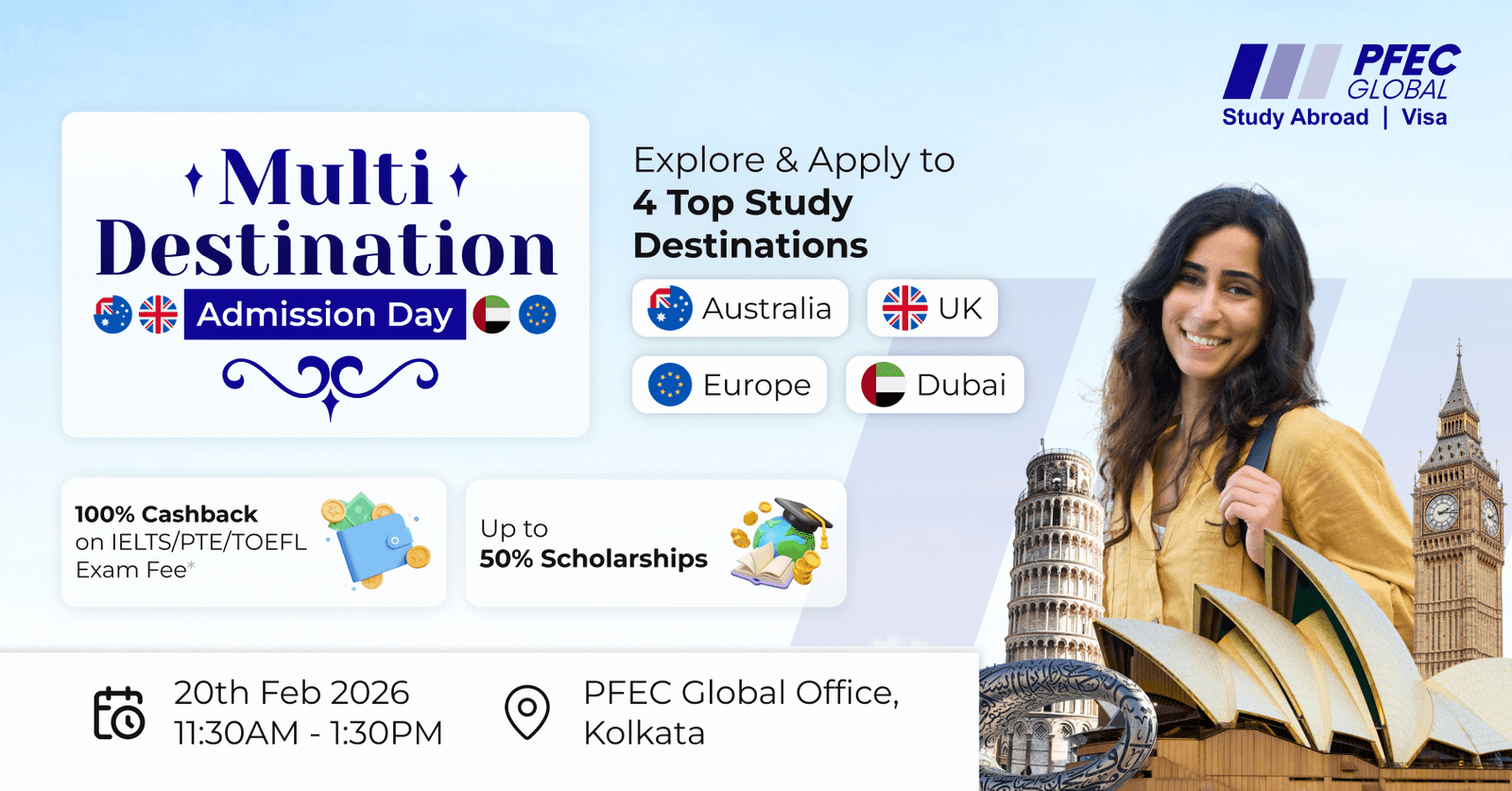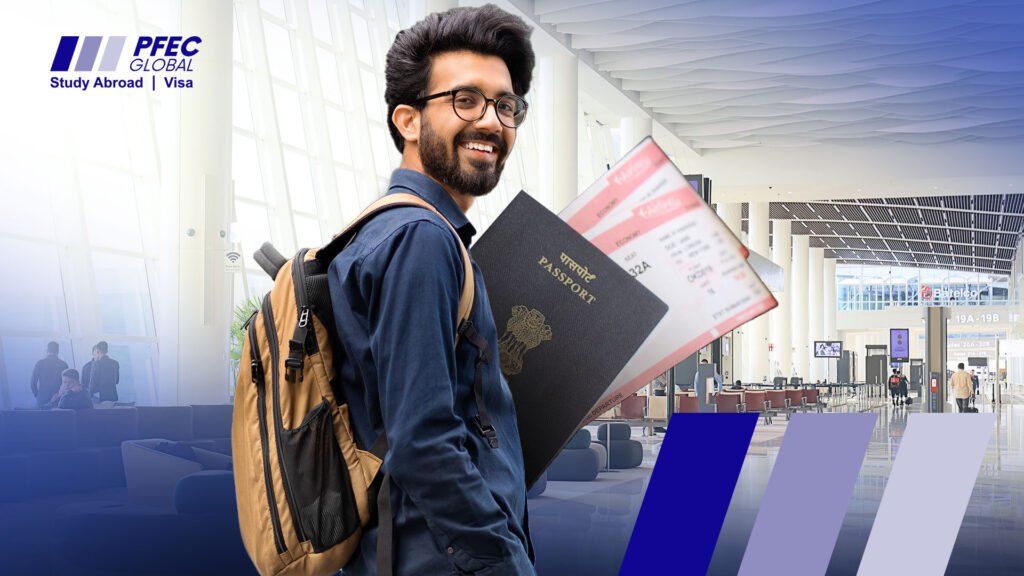Experience World-Class Education for Indian Students
- Priyanka Chandwani
- 8 min Read
World-class education offers Indian students more than just prestigious degrees — it builds global careers, practical skills, and life-changing confidence. From hands-on learning and internships to supportive campuses and PR pathways, countries like Australia, Canada, the UK, and the USA provide transformative academic experiences. With PFEC Global’s expert counselling, Indian students can choose the right course, secure scholarships, and step confidently into a globally competitive future. The journey starts with smart planning — and ends with global success.

Choosing to study abroad is exciting, but it can also be confusing. Everyone talks about world-class education, but not many explain what that actually means for Indian students.
Will it help you get a better job? Will it increase your chances of getting permanent residency? How do you know if a university truly offers global-level learning or is just using good marketing?
This blog gives you clear answers. You will understand why world class education matters, what to expect from it, and how to plan your study abroad journey with confidence. We also cover the real benefits and challenges so you can make smarter decisions.
If you want global skills, better career options, and personal growth, learning how to experience world class education for Indian students is the first step.
What Does ‘World-Class Education’ Really Mean?
A top-ranked university does not always mean better learning. A world-class education gives you real skills, practical knowledge, and international career options. It prepares you for the future, not just exams.
Here is what to look for.
Global Rankings That Reflect Real Quality
Universities listed in QS or Times Higher Education rankings often have strong research, good faculty, and modern campuses. But rankings are not everything.
Expert Tip: Check course-specific rankings. A university may be ranked lower overall but be among the best for your subject.
Career-Focused Learning
World-class institutions focus on hands-on learning. You will do projects, internships, and solve real-world problems. This makes you ready for jobs, not just degrees.
Example: Universities in Canada and Australia include internships as part of the course in fields like IT, nursing, and business.
Faculty With Industry Experience
You learn from professors who have worked in real companies. They share current trends, tools, and case studies that textbooks cannot offer.
Expert Tip: Visit the faculty section on university websites. Look for professors who have worked in your field.
Access to Innovation and Research
These universities invest in labs, tech tools, and research centres. You can work on real projects, publish papers, or even build your own startup ideas.
Fact: Seventy percent of research students in Australia are international.
Student Support and Campus Life
A world-class university cares about your success. You get access to counselling, career advice, housing help, and student clubs. These services help you feel safe and supported while living abroad.
Top Countries That Offer World-Class Education for Indian Students
- Australia
Offers job-ready courses and post-study work visas with PR potential - Canada
Known for affordable education, safety, and diverse culture - USA
Strong in research and innovation, especially for STEM and business - UK
Offers one-year master’s programs and global alumni networks
World-class education gives you better knowledge, international exposure, and real career advantages. It is not just about where you study, but how that experience shapes your future.
Why Experience World-Class Education Matters for Indian Students
Studying abroad is not just about getting a degree. It is about growing as a person and building a better future.
When you experience world class education as an Indian student, you join classrooms with students from over 50 countries. You learn how people from different cultures think, speak, and solve problems. This builds your communication skills and helps you work better in global teams.
You also get more than just theory. You complete live projects, work in modern labs, and take part in real internships. Professors share examples from the industry so you learn what companies expect.
This is how you prepare for jobs in India or abroad. You become more confident, better at solving problems, and more ready for life after graduation.
Expert Tip: Look for universities that offer co-op programs or paid internships. These give you work experience while studying.
“Studying abroad changed how I think, work, and present myself” – Meenal, Ahmedabad
Experience World-Class Education – Benefits and Challenges
Studying abroad has great rewards. But there are also real challenges. Here is a clear breakdown so you can plan better.
Benefits of World-Class Education for Indian Students
Higher employability
Global degrees improve your resume. Employers know that world-class education builds real-world skills. You are more likely to get interviews and better job offers.
PR pathways in top countries
Australia, Canada, and New Zealand offer clear post-study work options. Many students move from study to work to permanent residency through skilled migration programs.
Strong alumni networks
Top universities have alumni working at Google, Amazon, Deloitte, and more. These connections can help you with internships, jobs, and mentorship.
Better research and tech access
You will use modern labs, AI tools, and industry software that many Indian colleges do not provide.
Expert Tip: Ask your university if they are linked to companies for placements or research partnerships. This improves your learning and job prospects.
Challenges You Should Know Before Studying Abroad
Cultural adjustment
You may need time to get used to new food, weather, and teaching styles. Many students take 2 to 3 months to settle in.
Cost of living
You will need to plan for housing, food, transport, insurance, and internet. For example, average monthly living costs in Australia are ₹80,000 to ₹1.2 lakh.
Visa pressure and homesickness
The student visa process involves strict documentation. Once abroad, many students miss home and feel isolated at first.
Academic pressure
You must submit assignments on time, attend classes, and may also work part-time. Managing everything can feel stressful without support.
PFEC helps students prepare for the reality, not just the dream. We guide you on finances, cultural tips, mental wellness, and day-to-day life after arrival.
How to Choose the Right Country and University
Choosing where to study is one of the most important parts of your study abroad journey. Do not follow what others are doing. Focus on what matches your career goals and personal needs.
Start by asking yourself some key questions.
- Do you want a high-paying job after graduation?
- Are you looking for a PR pathway in the future?
- Is a safe and diverse lifestyle important to you?
Different countries offer different outcomes.
- Australia offers job-ready courses, strong Indian student communities, and clear PR routes
- Canada is affordable and has high visa approval and post-study work rates
- The UK is ideal if you want to complete a master’s in one year
- The USA is known for innovation, especially in tech, business, and healthcare
Compare these factors before choosing:
- Tuition and living costs
- Course length and structure
- Post-study work visa duration
- Student support services
- Availability of scholarships
- Size of Indian student population
Expert Tip: Use our Free University Shortlist Tool to match your goals with universities. It saves time and helps you choose smarter
Experience World-Class Education Insights for Study Abroad Planning
Proper planning helps you get the most from your study abroad experience. It also reduces stress and saves money. These tips are based on what thousands of successful students did right.
Start with the course, not the university
Rankings are important, but the course you study matters more. Choose one that fits your skills and leads to jobs in demand.
Expert Tip: Use the Skilled Occupation List in countries like Australia or Canada to find courses that support future PR.
Plan your budget early
Your budget must cover tuition, housing, food, transport, internet, health insurance, and visa charges.
Example: Living costs in Canada range between ₹60,000 to ₹90,000 per month. Tuition varies from ₹10 lakh to ₹25 lakh per year.
Set aside extra funds for books, student fees, and emergencies.
Prepare your documents in advance
These are the documents most universities require:
- Statement of Purpose (SOP)
- IELTS, TOEFL, or PTE scores
- Letters of recommendation
- Academic transcripts
- Proof of funds and bank statements
Start at least six months before the intake to avoid delays.
Think beyond the degree
Studying abroad is a long-term investment. Pick a course that connects with post-study work visas and PR goals. Look for internship options and university links with industry.
Start your study abroad plan 12 to 18 months before your desired intake. This gives you time for exams, documents, shortlisting, and visa processing.
Mistakes to Avoid While Chasing a “World-Class” Dream
It is easy to get excited when planning to study abroad. But chasing the dream of world-class education without the right planning can lead to poor decisions.
Here are the most common mistakes Indian students make—and how to avoid them.
Choosing only based on rankings
A high university rank does not always mean better results for your career. Many students pick a top-ranked school but ignore things like course outcomes, job placements, or visa support.
Expert Tip: Check if the course includes internships, career training, or a post-study work pathway.
Ignoring course outcomes or PR chances
Always research whether the course is on the Skilled Occupation List of your target country. This impacts your ability to stay and work after graduation.
For example: Nursing, software development, and civil engineering are often listed on PR-friendly programs in Australia and Canada.
Not applying for scholarships
Many students miss out on available funding because they assume they will not qualify. Universities often have merit-based or need-based scholarships for Indian students.
Expert Tip: Apply as early as possible. Many scholarships are given on a first-come basis.
Taking advice from unreliable sources
Following what friends, family, or social media say can mislead you. Every student has a different background and goal.
Always take advice from licensed and experienced study abroad consultants.
Avoiding these mistakes will help you make smarter choices and experience world class education benefits and challenges in a planned and successful way.
How PFEC Global Helps You Experience World-Class Education
At PFEC Global, we help Indian students turn their global education goals into reality. Our support covers everything from shortlisting to settling abroad.
Here is how we simplify the process and ensure better outcomes.
1-on-1 counselling that puts your goals first
We do not follow a one-size-fits-all plan. Our expert counsellors help you choose the best course and country based on your skills, budget, and PR plans.
Complete application support
We help you write strong SOPs, gather the right documents, apply for scholarships, and submit accurate visa applications.
Expert Tip: A strong SOP can increase your admission chances by 30 to 40 percent, especially in competitive courses.
Post-landing support to help you settle
Our support continues after you land. We assist with finding accommodation, understanding part-time job rules, and adjusting to life abroad.
Trusted by thousands of Indian students
We have a 98 percent visa success rate and partnerships with over 200 global universities. Our students have been placed in Australia, Canada, the UK, and the US.
This is how we help Indian students experience world class education with confidence and clarity.
Your goal is to study abroad. Our mission is to get you there with the least stress and the right plan.
Final Thoughts – Start Your Journey with Confidence
Studying abroad is a big decision. It takes time, money, and effort. But if you plan it well, it can change your future.
To truly experience world class education for Indian students, you need more than good grades. You need clear goals, the right course, and strong support at every step.
Focus on what matters. Look beyond rankings. Understand the full picture—including the experience of world class education benefits and challenges.
The right education can open global doors. But smart planning helps you walk through them with confidence.
Ready to experience world class education? Talk to PFEC experts today and start planning your future.
FAQs – Experience World-Class Education for Indian Students
What are the benefits of world-class education abroad?
You gain global exposure, access to modern labs and teaching, and build practical job-ready skills. You also join strong alumni networks and improve your chances of global employment. These are key reasons why experience world class education matters for Indian students.
Is studying abroad worth it for Indian students?
Yes, if you plan your path carefully. Choosing the right course in the right country can lead to better salaries, long-term career growth, and a smoother path to post-study work or permanent residency.
Expert Tip: Track career outcomes and PR rates for your chosen course before applying.
Which countries offer the best return on investment for Indian students?
- Australia offers strong post-study work and PR options
- Canada provides affordability and high visa approval rates
- The UK has short one-year master’s programs and global exposure
- The USA leads in research and innovation, especially in tech fields
Compare tuition, cost of living, and stay-back periods before making a decision.
How do I afford a world-class education?
Apply early for merit-based or need-based scholarships. Choose affordable cities over expensive metros. Budget for tuition, housing, food, and travel.
Expert Tip: Work part-time during your studies to support daily expenses. Many countries allow 20 hours of work per week.
Can I work while studying in countries like Australia or Canada?
Yes.
- In Australia, you can work up to 48 hours every two weeks
- In Canada, you can work 20 hours per week during academic sessions
These jobs help you manage costs and build work experience alongside your degree.

Take your Study Abroad Dreams to the Next Level
Receive free end-to-end assistance and personalized guidance from experts
Get Started for FREE →

